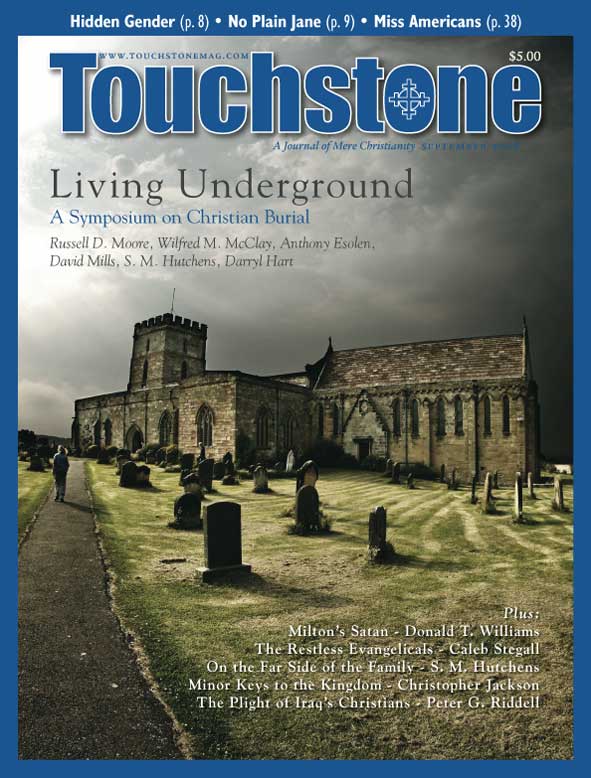Restoring a Reformer
Calvin, Participation, and the Gift: The Activity of Believers in Union with
Christ
by J. Todd Billings
Oxford University Press, 2007
(218 pages, $100.00, hardcover)
Image and Word in the Theology of John Calvin
by Randall C. Zachman
University of Notre Dame Press, 2007
(548 pages, $55.00, hardcover)
reviewed by Peter J. Leithart
In the popular imagination, John Calvin remains the dour, tyrannical, unrelentingly pessimistic preacher of predestination and depravity, whose zealous fingers itched for the faggot that would set the latest heretic aflame. He has had able defenders, Pulitzer Prize novelist Marilyn Robinson surprisingly among them. But not enough. Almost five hundred years from his birth, he’s still looking for a decent press agent.
Theologians have different prejudices against Calvin, but they have their prejudices nonetheless. In different ways, Todd Billings and Randall Zachman both address academic distortions of Calvin’s theology. Though neither is exhaustive, each sketches the main contours of Calvin’s thought from an unexpected vantage.
The Participatory Calvin
A revision of his Harvard doctoral thesis, Billings’s Calvin, Participation, and the Gift is the more polemical of the two. His target is the portrayal of Calvin’s theology found in the “Gift theologians,” particularly those associated with the Radical Orthodoxy movement, who have placed “gift” at the center of their discussions of grace, revelation, and ethics.
Their critique is nicely summarized by the historian Natali Zemon Davis, who argues that Calvin’s emphasis on unilateral grace undoes the divine-human and human-human reciprocity central to medieval theology and life. Calvin reduces human beings to utter passivity and displaces love from the center of Christian existence in favor of more abstract, passive virtues like faith. Human beings are inert recipients, never active givers in their own right.
Along similar lines, Radical Orthodoxy’s triumvirate—John Milbank, Catherine Pickstock, and Graham Ward—charge that Calvin uses the word “participation” but in a far weaker sense than earlier theologians. Because of Calvin’s nominalist assumptions, they charge, “participation” is closer to the idea of “agreement” than to “sharing divine life.” This is especially evident in his doctrine of justification, which reduces it to a legal or “forensic” imputation of Christ’s righteousness. Calvin is thus partially responsible for the collapse of ancient Christian participationist metaphysics (and social theory) into modern contractarian legalism.
The Eclectic Calvin
Billings, who teaches at Western Theological Seminary, demonstrates that such critics misread Calvin. Calvin is neither a nominalist nor indifferent to philosophical questions, but made eclectic use of philosophical concepts as needed for exegesis or theology.
Peter J. Leithart is an ordained minister in the Presbyterian Church in America and the president of Trinity House Institute for Biblical, Liturgical & Cultural Studies in Birmingham, Alabama. His many books include Defending Constantine (InterVarsity), Between Babel and Beast (Cascade), and, most recently, Gratitude: An Intellectual History (Baylor University Press). His weblog can be found at www.leithart.com. He is a contributing editor of Touchstone.
subscription options
Order
Print/Online Subscription

Get six issues (one year) of Touchstone PLUS full online access including pdf downloads for only $39.95. That's only $3.34 per month!
Order
Online Only
Subscription

Get a one-year full-access subscription to the Touchstone online archives for only $19.95. That's only $1.66 per month!
bulk subscriptions
Order Touchstone subscriptions in bulk and save $10 per sub! Each subscription includes 6 issues of Touchstone plus full online access to touchstonemag.com—including archives, videos, and pdf downloads of recent issues for only $29.95 each! Great for churches or study groups.
Transactions will be processed on a secure server.
more from the online archives

8.4—Fall 1995
The Demise of Biblical Preaching
Distortions of the Gospel and its Recovery by Donald G. Bloesch
calling all readers
Please Donate
"There are magazines worth reading but few worth saving . . . Touchstone is just such a magazine."
—Alice von Hildebrand
"Here we do not concede one square millimeter of territory to falsehood, folly, contemporary sentimentality, or fashion. We speak the truth, and let God be our judge. . . . Touchstone is the one committedly Christian conservative journal."
—Anthony Esolen, Touchstone senior editor









